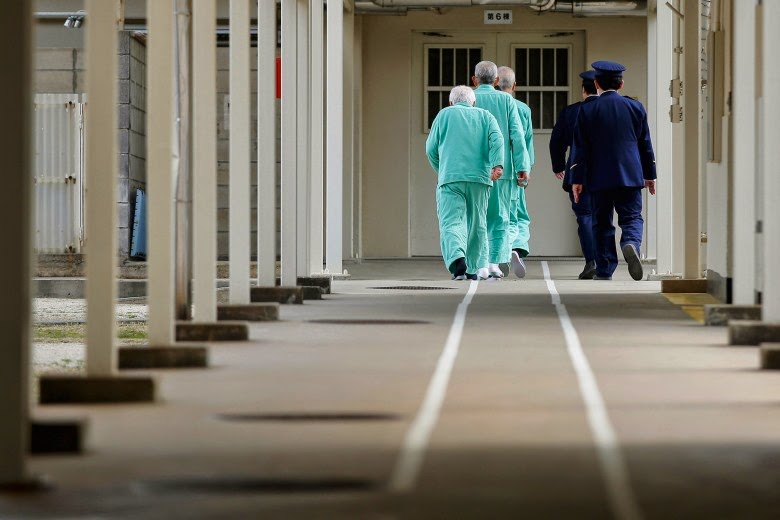 |
| Elderly doing crime for prison's food, shelter, and--indeed--companionship. |
Japan's depopulation is well and truly underway, with population having declined to turn-of-the-millennium levels as reported recently. With a general population that is rapidly greying, it should be no surprise that the prison population is also greying despite Japan being a law-abiding nation by and large. In fact, with a rising proportion of elderly prisoners, these facilities increasingly act as nursing homes instead of corrective facilities. What is quite sad is that many released prisoners commit petty crimes to get back into prison. After all, homelessness and hunger do not look like attractive propositions in societies where family members are distant or non-existent:
Most prisons spend a lot of time and effort keeping inmates from escaping. In Japan, the greater challenge is persuading convicts to leave. Among developed economies, Japan has one of the highest proportions of elderly prisoners. Crimes committed by senior citizens have quadrupled over the past two decades. Today, almost one in five convicts is over 60. The soaring costs of caring for these graying jailbirds are an added pressure on Prime Minister Shinzo Abe’s government, which is already burdened by a world-class debt load equal to roughly 240 percent of gross domestic product. To reduce repeat offenses, Japan aims to slash the number of convicts who are homeless at the time of their release by more than 30 percent by 2020...If you think Japan's prisons are cushy Pablo Escobar-like outfits, you are grossly mistaken. However, compared to a life of destitution on the mean streets of Japan, prison life looks relatively attractive, hence the high rates of recidivism among elderly prisoners:
Hitting such targets will be tough, particularly given the surge over the past decade in elderly prisoners, who often prefer a government-subsidized life behind bars to an isolated, destitute one on the outside.
“Japan’s prisons are in poor condition, mostly without heating or air-conditioning,” says Koichi Hamai, a professor of criminology at Ryukoku University’s law school. “But they still prefer to be there, rather than outside. They have mates and food and are well cared for...”Efforts to reform the system are underway since welfare is actually cheaper than incarceration:
Elderly criminals recycle in and out of the system because they lack family and financial support. They are often disabled and treated like outcasts in their local community. “Some prisons have become like nursing homes,” said Ryotaro Sugi, who was given the honorary title of special corrections officer by the Justice Ministry in 2008 to advocate for prisoners’ welfare after visiting jails over almost five decades. “Many need assistance for walking, bathing and eating...
Criminal offenses by those age 60 and over have quadrupled to 46,243 cases over the two decades that ended in 2014, according to Japan’s Ministry of Justice.
Japan budgeted 230 billion yen ($1.91 billion) for running its jails in the year ended March 2015. It costs about 3.2 million yen [about USD26,900 at present exchange rates] to keep someone locked up for a year, according to the Justice Ministry. That’s about double what a person on standard welfare can get. Under Japanese sentencing guidelines, repeat offenders of petty crimes, such as shoplifting, can spend as long as five years behind bars. In theory, someone stealing a 1,000 yen ($8.30) bento lunch box could end up costing the state 16 million yen to imprison for a maximum sentence.What makes this story sadder than that of the American third-graders is that these are folks whose lives are near the end and accept a fairly miserable plight as repeat offenders in the absence of any real alternatives. I cannot imagine a loneliness worse than that which haunts these folks. It again raises questions about closed societies and migration: Who will care for the elderly? Who will pay for societal institutions? Make no mistake: like the United States, Japan is another developed society whose accelerated development portends issues the rest of the world will have to confront a couple of years into the future.
It makes me very, very sad indeed, but hopefully the research I am performing can help the plight of developed and developing countries alike deal with the consequences of aging societies. Extreme policies don't count. Make no mistake: these are today's pressing issues -
I wish my teacher knew how sad the elderly people are in Japan.

